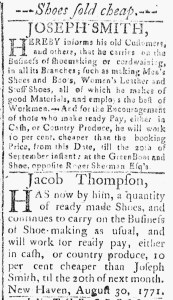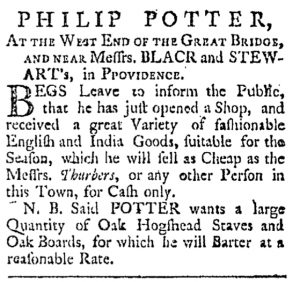What was advertised in a colonial American newspaper 250 years ago today?

“Ladies and Gentlemen … will be used in the most genteel Manner.”
When Richard Mathewson of East Greenwich, Rhode Island, “opened a House … for entertaining Gentlemen,” he placed an advertisement in the April 4, 1772, edition of the Providence Gazette. He also stabled horses and “carries on the Baker’s Business,” offering those “and other Conveniences” for entertaining “in the best Manner.” One of his competitors, William Arnold, saw in that advertisement an opportunity. Three weeks later, he began running his own notices that made explicit reference to Mathewson’s advertisement. “WHEREAS in the Providence Gazette, of April 4,” Arnold declared, “we find an Advertisement setting forth, that Richard Mathewson … will entertain Horses and Men; I therefore, in Compassion to the tender and delicate Constitutions of the fair Sex, have opened the Doors of my House to both Ladies and Gentlemen.” He pledged that all customers “may depend they will be used in the most genteel Manner” as they enjoyed the amenities at “one of the most convenient Houses, well fitted with Lodgings, and stored with Provisions of the best Kind.”
Only on rare occasions did eighteenth-century advertisers make direct mention of their competitors. They frequently made generalizations about offering the lowest prices, stocking the most extensive inventory, or providing the best customer service relative to what consumers would find elsewhere in town, but very rarely did they name their competitors or make direct comparisons between their goods and services. Arnold decided that such a comparison would serve him well in his marketing efforts, distinguishing his public house and inn from the one operated by Mathewson. In making his business accessible to “the fair Sex,” he implied that he cultivated a more genteel atmosphere than Mathewson managed for “Gentlemen, and their Horses” at his establishment. Arnold suggested that the presence of “both Ladies and Gentlemen” meant that his customers could expect a more refined environment than they would experience at Mathewson’s “House … for entertaining Gentlemen.” Taverns and coffeehouses often tended to be masculine homosocial spaces in early America, but Arnold surmised that running an appropriately “genteel” house of entertainment could attract patrons less interested in visiting one that marketed itself as catering primarily to “Gentlemen, and their Horses.”


